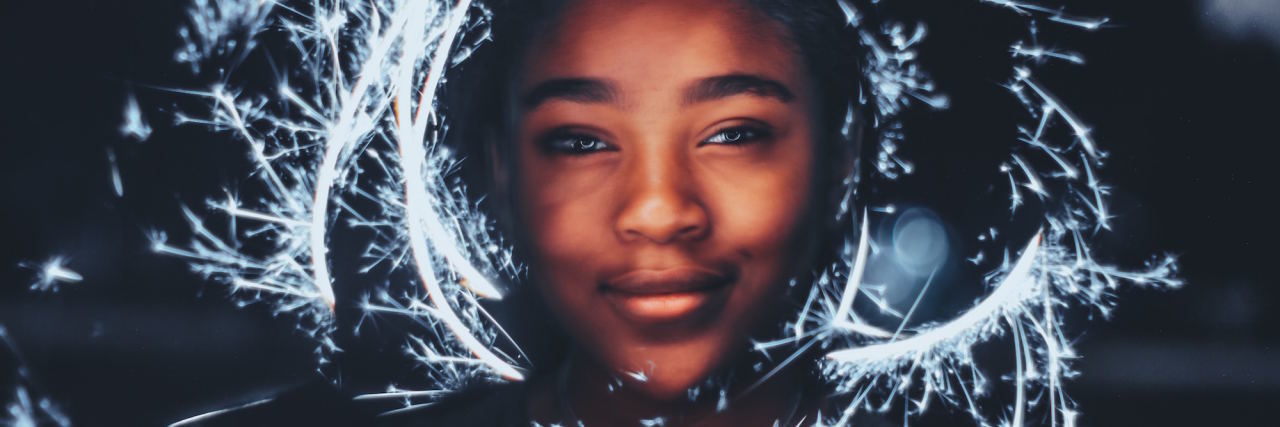The Important Form of Self-Care I Discovered as a Black Woman With Depression
Self-care has been talked about more in the past three years than I have seen it talked about my entire life.
Self-care is the act of taking care of oneself — physically, emotionally and mentally. It’s honoring and allowing yourself what you need.
I started my path to reclaiming my blackness and womanhood in 2014.
It was the year I started wearing red lipstick, regardless of whether or not I was supposedly “too dark” for it. It was the year I started praising my dark skin, and the year I cut off all of my permed hair, allowing curls to sprout up like flowers do in the Spring. I fought everything I was told I wasn’t allowed to do or supposed to do due to my complexion and history.
My self-care needs on the bare minimum were always being met to the best of my abilities. I did my best to eat, even when my eating disorder screamed at me not to. I paid my bills, even if I knew I would much rather have new makeup brushes.
As I went deeper into my racial reclamation journey, I was faced with new problems. These problems surrounded debates over my humanity with people who thought their opinions about my livelihood and right to exist freely and safely were controversial. These problems surrounded intrusive thoughts of comparison to my white (or generally lighter) counterparts. These problems surrounded being literally surrounded by anti-black media regardless of whether I was in personal social circles, watching television shows or just on the internet.
I didn’t know of a solution to these problems. I performed the basic acts of self-care they tell you to perform. I said my daily affirmations. I counteracted every problematic self-hating thought I had. I fought for my right to exist freely and happily, and for my individualized blackness, but it really felt like a losing battle.
Loving yourself as a black girl is a radical notion.
By embracing it, you’re embracing the notion that you are worth love, success and really everything that is meant and made for you. It means that you write your own story, you’re in control of your own narrative and no one can tell you that you aren’t worthy.
Living with this ideology in your heart changes your life. It changes how you see yourself, but it doesn’t necessarily change how the world sees you.
It’s why they rely on the jezebel, mammy and sassy black woman stereotypes when casting us in music videos or television shows. It’s why they make us play second fiddle to every other person of every other race. It’s why we’re conditioned to take care of everyone else before we take care of ourselves in our personal and professional lives.
That’s when I learned loving myself as a black girl was only part of the equation. The other half was surrounding myself with other intersectional black women. It became one of the most important forms of self-care I would ever discover.
I joined communities online and in-person with black women who had similar interests.
I listened to more black artists such as SZA or Jhene Aiko instead of solely listening to white pop stars that dominated the radio stations.
I read books and watched movies where black women were at the forefront. We were not the best friend or the supporting character to the black man or the white woman. Instead, we were the focus. We were the ones saving towns, falling in love and changing the world.
I made black women in every context the center of my world while not demonizing myself for still enjoying content from white creators and artists. This allowed me to not only rewrite the narrative around black women, but support other black women doing the same.
It allowed me to see black women doing amazing things and living in wholeness, regardless of what others had to say. It showed that even when the world doesn’t have our back, we got us. We always got us.
Even when you love yourself, your hair and your essence as a black girl, you will still have moments of uncertainty. You’ll still have nights where you wished you were white. You’ll still wonder why you were born in the skin you were in with the problems that come from being marginalized. Those intrusive race thoughts are real, even if people don’t talk about them.
Some looked at me surrounding myself with blackness as a form of self-segregation. I argue that if a marginalized person chooses to segregate themselves from their oppressor, it is not segregation in the negative context surrounding America’s history with Jim Crow. Instead, it is self-preservation.
They say you shouldn’t put yourself in a bubble, and that you should diversify your environment.
I argue that when living in a world that tries to tell you that you should be ashamed of your blackness and womanhood, being in a bubble is the best form of self-care you will ever be able to give yourself.
Unsplash photo via

